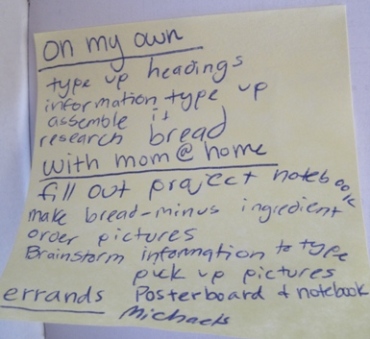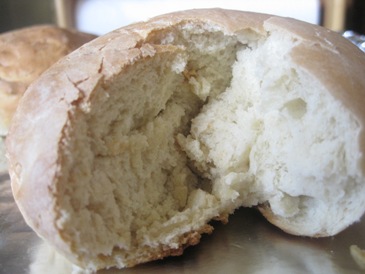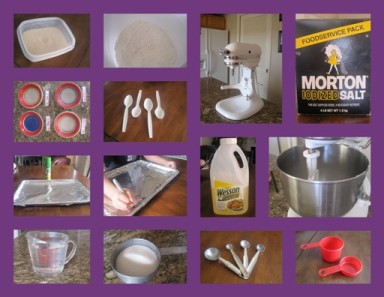For anyone who has tackled a science project, or any kind of project, here is a Community Contribution from April Perry
Tackling a 5th-Grade Science Project
My 11-year-old daughter came home with a huge packet of science project information a few weeks ago, and the entire family started feeling the stress. Before the world of computers and fancy tri-fold poster board, science projects were a cinch. I remember hunkering down at my dining room table with construction paper, some magic markers, and a simple sheet of white poster board. But today’s children have a lot more pressure. They need charts and graphs, digital photographs, and well-written hypotheses. It’s enough to overwhelm the children and the parents.
Instead of letting the stress get to me, I decided to apply the principles I learned from Getting Things Done and show my daughter that projects don’t have to give us headaches. Here’s what we did:
Step 1: We read through the packet of information and made a list of tasks based on context.
My daughter got out a little sticky-note pad, and she divided her tasks into the following categories:
- On My Own
- With Mom @ Home, and
- Errands
Step 2: Each day we started checking things off the list, depending on our energy level, schedule, etc. When we were out at the mall one evening, my daughter said, “Since we’re running errands, can we pick up the poster board and notebook I need from the art store?” Fifteen minutes later, it was done.
When I was helping the other children with their homework after school, my daughter did the typing and research she’d already determined she could do on her own. Even though she was a little timid at first, it turned out great.
On the days we didn’t have anything planned, we looked at the list of things we needed to do together. Her project was to see what would happen to a loaf of bread when one of four ingredients was left out. So one day, I stayed in my pajamas until noon while we mixed up five different little loaves of bread, including the “control” loaf. Then we ate the tasty ones for lunch.
The greatest part was that whenever my daughter would say, “Mom, I don’t want to do the Science Fair,” I would say, “Don’t think about the whole project. Just think about your next action. What is the next, specific thing you need to do?” Since she’d already taken the time to identify each task, it only took a second for her to figure out the next action. She became much more calm and confident as the project progressed.
Step 3: We set a date on the calendar for when we would put the entire project together. Prepping each component of the project wasn’t too difficult, but we knew we needed an entire evening to print and assemble everything onto the poster board. Our little three-year-old LIVES for projects like this, and we were sure that involving him would spell “catastrophe.”
When my other daughter and husband bought tickets to attend the Daddy-Daughter Dance at school one Friday night, we decided that would be the perfect time to have our own party, science-fair style. We put it on the calendar and didn’t worry about the details one bit. We tucked the three-year-old in bed and had such a fun time cutting our print-outs, chatting, gluing, and enjoying our work together. We even learned to make photo collages together using Picasa, and she was so excited to make the background purple.
Tackling the Science Fair together strengthened our relationship, gave me a chance to teach my daughter about project planning, and even provided a tasty lunch along the way. The smile on her face when we finished that project was priceless, and now we’re already brainstorming for next year.
April Perry is the mother of four children and the Co-Director of The Power of Moms.





This is great – at my daughter’s school, the science fair is mandatory. We got through ok, but I will have her line out all the steps next year – it is never too early (or late) to teach basic project management….and she certainly will need it in middle school.
Thanks so much for your comment, Lise! I wish you the best with next year’s science fair project. And you’re right–teaching project management is a great skill for children of all ages. We have other types of school projects about once a month, and as I’ve taught my little ones how to organize them, the experiences have been much less stressful.
I just went through a similar use of GTD methods with my own 5th and 7th grade sons’ science fair projects. It is amazing the amount of effort expected on these for kids these days!
We used a streamlined version of the Natural Planning Model at the beginning. I got them to think about the outcome they wanted, and then we kind of treated it like a game to work backwards and figure out all the “steps” (I.e., Next Actions) needed to get from where we were to where we wanted to be.
We created a checklist to work from, and believe me, they get just as much satisfaction from checking things off as done as we grown-ups do!
Thanks for the great post.
Doug, I love that you helped your children visualize the outcome they wanted. The Natural Planning Model is GREAT for kids!
Real inspiring story! I love that what some people seem to see as an ‘over the top’ process can not only bring results but build relationship and equip people for life.
I’m just learning GTD, and finding it helpful already. I hope I can be of help to my kids like this when they get a bit older (and I get a bit wiser with the system!)
Thanks so much, Chris! It’s funny (and you’re right) that people consider this kind of organizing as “over the top.” I see it as essential to stress management.
Good luck with your GTD process. It’s wonderful!
This is absolutely not over the top for kids today – it’s actually a valuable process that some teachers still don’t realize they need to teach to kids. Those with organizational and time management issues, or those who don’t have parents available to help them at home are at a particular disadvantage. Learning to manage this type of project is key to success in school from upper elementary grades on. If you are a part of your school’s PTA, this would be a great presentation at a meeting.
Kudos!
Thanks for the great idea, Pam. I think I’ll talk to our PTA this week and see if they’re interested. I agree–if moms, dads, and teachers learn to teach these kinds of things to their children, I can’t even imagine the impact.